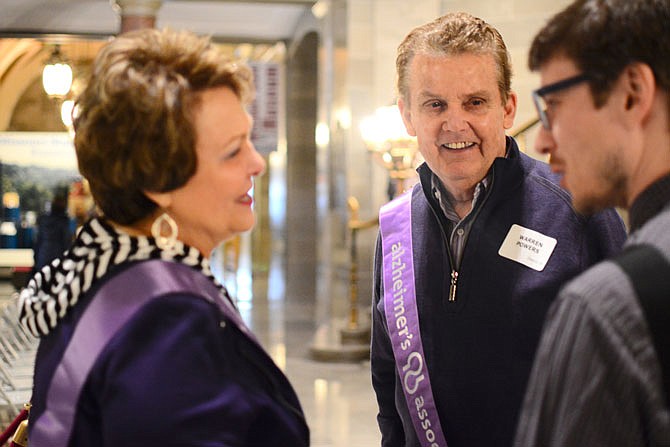No one should have to contend with a loved one's fight with memory loss associated with Alzheimer's disease.
It's a struggle Linda Powers faces every day.
The wife of former University of Missouri head football coach Warren Powers - who was diagnosed with the disease in 2012 - was the keynote speaker during Memory Day on Wednesday. The Greater Missouri Chapter of the Alzheimer's Association holds the event every year to educate lawmakers about the disease and to urge them to continue providing "respite funding" for grants the association gives Missourians.
Respite funding allows people like Linda Powers - caretakers of Alzheimer's patients - a break from their struggles.
In 2009, three years before her husband's diagnosis, Linda Powers said she noticed something was wrong with him. She just couldn't put her finger on it. Her husband had been an athlete - involved in football at the high school, college and professional levels.
The diagnosis signaled a sea change in the Powers' lives.
As the disease progressed, it robbed the couple of "what should have been wonderful years," Linda said.
Now, Warren can't do simple things without direction - things like taking a shower or brushing his teeth.
"Every day you hear the same question over and over and over again, until I just want to scream," Linda said, bursting into tears. "You know what I do every day? I pray. I truly pray for patience."
Patience is a virtue the association and its members have learned.
What members need is support from legislators, they said during the Alzheimer's Association's annual lobby day at the Capitol in Jefferson City. What they require are funds for their grants.
The grants allow family members taking care of patients at home to meet their own needs, said Lucy Tran Williams, public policy manager for the organization's Columbia office.
A grant could be used to pay someone to stay with the patient while the spouse does chores, goes shopping or gets medical treatment, Williams said. The grants are sometimes used to pay for Alzheimer's patients' brief stays in care facilities.
Alzheimer's is the sixth-leading cause of death in Missouri, Williams said. It affects more than 110,000 Missourians, 70 percent of whom receive care at home. The value of that uncompensated care (based on the hours caregivers spend with patients) is estimated at $4.3 billion.
Yet the state provided only $450,000 in grants for respite care in 2017.
"The governor tried to cut our budget in half," Williams said. "The (Subcommittee on Appropriations - Health, Mental Health and Social Services) restored our funding. You can never be too sure in Jefferson City."
The association on Wednesday presented the subcommittee's Chairman Rep. David Wood, R-Versailles, and Ranking Minority Member Rep. Deb. Lavender, D-Kirkwood, with "Leadership of the Year" awards for intervening on the association's members' behalf.
Wood said the disease has stricken his wife's family. At least 10 members they counted suffer with Alzheimer's.
"It's so important for you (caregivers) to get a break," Wood said. "Funding for this was easy. I don't deserve an award. You deserve awards."
Data show there are about 312,000 unpaid people providing care for patients in Missouri. They need the respite, Williams said.
"That mental and physical break are important," she added.
It's why so many turned out Wednesday.
Among them was Christa Roehl, of Jefferson City.
Three of Roehl's close family members have suffered from the disease and other conditions that cause cognitive impairments.
Three years ago, Roehl said, her mother was diagnosed with Alzheimer's. About a year ago, the family moved her into a memory care facility, which specializes in housing people with forms of dementia. No one comes or goes at the facility without being buzzed in or out.
People there tend to wander, she said.
"They want to go home, even though they don't know where home is," Roehl said. "You do whatever you can to try to keep them happy."
There is a history of dementia in her family, Roehl said. Her grandfather had Alzheimer's, but that wasn't discovered until after he died and an autopsy was performed.
Her uncle has vascular dementia, which is cognitive impairment caused by strokes. The symptoms can be very similar to Alzheimer's disease.
Roehl said she often speaks with her cousin and they share experiences caring for their loved ones with dementia.
She watched as her father struggled to care for her mother.
He felt he was always "on." He never had a chance to relax or care for himself.
"That started to wear on him," Roehl said. "He wasn't sleeping. He was getting depressed at times. As his children, we could see the effects of what it was doing to him."
She said she volunteers with the Alzheimer's Association because it's important to raise awareness of the seriousness of the disease and to give caregivers a chance to take care of themselves.
"I would love for my kids to never have to deal with this disease," Roehl said. "That's pretty much why I do it. It is sad. And it's scary to think that maybe I will get it."

